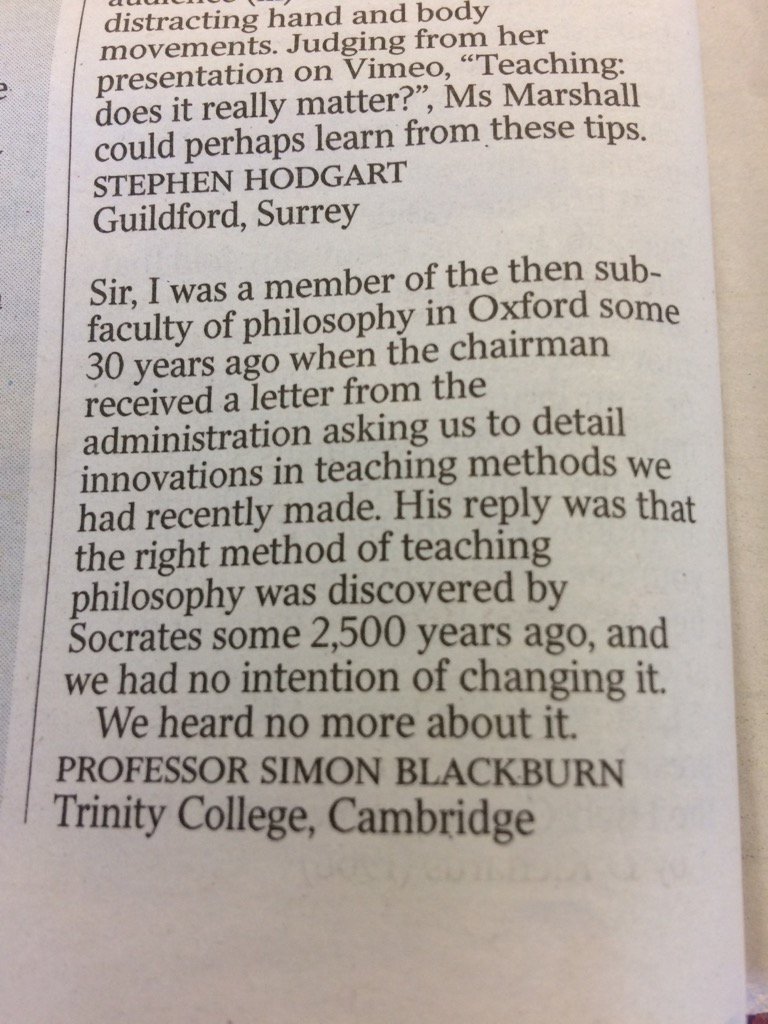September 29, 2016
This Post is Old!
The post you are reading is years old and may not represent my current views. I started blogging around the time I first began to study philosophy, age 17. In my view, the point of philosophy is to expose our beliefs to rational scrutiny so we can revise them and get better beliefs that are more likely to be true. That's what I've been up to all these years, and this blog has been part of that process. For my latest thoughts, please see the front page.Teaching Like Socrates?
 The Daily Nous heap of links today contained the image to the right (click for a larger view) which appears to be a letter to the editor of some newspaper by Simon Blackburn. I found the letter interesting and amusing, and it has something of a point, but it would be a big mistake to use this point to exempt philosophy departments from broader university conversations about pedagogy. The fact is, first, although the central pedagogical idea most associated with Socrates—that we teach by raising questions that cause students to re-examine their views—is certainly sound, this is really only the beginning of an actual pedagogical approach. Second, Socrates' methodology is suited primarily to individual interaction between student and teacher. In fact, much of the discussion of pedagogy in the modern university has to do with how to achieve the kind of results Socrates (sometimes) achieved in the context where that level of individual attention is not possible. What does 'Socratic' teaching look like in a lecture containing 100 students? If you pick one student and start asking and answering questions, isn't there a possibility that the rest will be just as disengaged as they would have been if you just kept lecturing?
The Daily Nous heap of links today contained the image to the right (click for a larger view) which appears to be a letter to the editor of some newspaper by Simon Blackburn. I found the letter interesting and amusing, and it has something of a point, but it would be a big mistake to use this point to exempt philosophy departments from broader university conversations about pedagogy. The fact is, first, although the central pedagogical idea most associated with Socrates—that we teach by raising questions that cause students to re-examine their views—is certainly sound, this is really only the beginning of an actual pedagogical approach. Second, Socrates' methodology is suited primarily to individual interaction between student and teacher. In fact, much of the discussion of pedagogy in the modern university has to do with how to achieve the kind of results Socrates (sometimes) achieved in the context where that level of individual attention is not possible. What does 'Socratic' teaching look like in a lecture containing 100 students? If you pick one student and start asking and answering questions, isn't there a possibility that the rest will be just as disengaged as they would have been if you just kept lecturing?
Perhaps part of Blackburn's objection is to the notion that good pedagogy must necessarily be innovative—that everything good must be new. It's true that the fact that a method or technique is new is no evidence that it's good—any more than the fact that a technique is old is evidence that it's good! But as a historian of philosophy I'd certainly like to think that applying old ideas to new contexts is a kind of progress, and indeed a kind of innovation.
All that is to say: I understand (and feel) the tendency toward irritation with buzzwords like 'flipped classroom' and 'student-centered learning,' especially when these sorts of techniques are presented as 'innovative' as though they were never done before now. These kinds of ideas do have connections and similarities to Socratic pedagogy. And maybe it's even true that philosophy departments were doing some of this 'before it was cool'. But it's delusional to think that we've been doing just this all along in a continuous history reaching back to Socrates without ever lapsing into lecture and rote memorization mode, and it's a mistake to suppose that the fact that we have a track record of trying to get students to think for themselves in response to open-ended questions means that we have no need to pay attention to contemporary discussions about how best to achieve that goal. We all know that just asking students philosophical questions doesn't guarantee that all of them will start thinking—let alone thinking well! Even if your teaching assignment was to harass random strangers in the marketplace (rather than, you know, teach enrolled students in a classroom) Socrates still wouldn't have all the answers for you.
I know, I'm taking this way too seriously!
| Trackbacks |
TrackBack URL for this entry: https://blog.kennypearce.net/admin/mt-tb.cgi/794
|